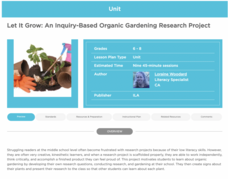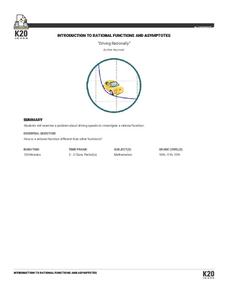Beyond Benign
Real Cats Wear Pink
Does your cat sneak up on you in the middle of the night? Maybe it would help if he glowed in the dark like Mr. Green Genes, the first fluorescent cat in America. In a fun and engaging lesson about genetic engineering, high school...
Beyond Benign
Urine Jeopardy
Urine can tell us a lot about what is happening in our bodies. In a hands-on activity, scholars administer pH, glucose, ketone, and protein tests to a sample of "urine" solution made from household ingredients. Their results lead them to...
Beyond Benign
ACNE (Another Cat Needs Exfoliation)
Take solace, teens ... cats get acne, too! After making a diagnosis in the previous lessons in the series, learners must now decide on a treatment to complete the sixth installment of this biotechnology unit. The typical treatment for...
Beyond Benign
E-Factor: Environmental Impact Factor
Explore how chemical processes reduce production waste. The 19th lesson in a 24-part series has learners explore the impact of green chemistry techniques on waste in production scenarios. They consider petrochemicals, bulk chemicals,...
Beyond Benign
SLS Today
Lather is not necessary for an effective shampoo. After learning of the industry created consumer misinformation, individuals investigate the toxicity of the most popular additive in shampoos to create lather. They use their results to...
Beyond Benign
Shampoozled—Part 2: pH Neutral
Who doesn't want balance in shampoo?!? The second of a two-part lesson continues the preparation of a shampoo formula. This time, individuals focus on how to control the pH of the product. This is the 12th installment of the overall...
Beyond Benign
Shampoozled—Part 1: Formula Calculation
Time for your classes to show off what they've learned! The 11th installment in the series of 24 uses concepts learned in the previous 10 lessons to create the perfect shampoo formula. Their formulas consider both sustainability and...
Beyond Benign
Solvent Snapshot
Discover the properties and purpose of chemical solvents. Continuing with the theme of shampoo ingredients, the 10th lesson of this 24-part series investigates the choice of solvents in shampoos. Through their exploration, they learn how...
Beyond Benign
Orb-It
How do the products you use rate on a greeness scale? Scholars use a tool to analyze shampoos and cars for their sustainability. They consider factors that affect the environment, the economy, and equity. This is the ninth lesson in a...
Beyond Benign
Cookie Equations
Cookies and chemical equations have a lot in common! Using cookies as a reference, scholars learn to balance chemical equations. Pieces of the cookies represent different parts of the compounds and elements. This is the sixth installment...
Beyond Benign
Is It Easy Being Green Game Show
Is it possible to create an environmentally friendly shampoo? Learners accept this challenge in the fifth lesson in a green chemistry series of 24. The analysis of their shampoo ingredients must address pH, exothermic reactions, and...
Beyond Benign
The Story of Cosmetics Video Assessment
Does your shampoo contain carcinogens? Scholars learn how cosmetic companies create and market their products, many of which contain toxic chemicals. They examine the bias and consumer responsibilities in the industry.
Beyond Benign
Writing the Principles
What is the difference between chemistry and green chemistry? The first lesson of the 24-part green chemistry series introduces scholars to its 12 principles. The tendency is toward nontoxic materials and sustainability.
ReadWriteThink
Persuasive Essay: Environmental Issues
Young environmentalists learn how to craft a persuasive essay about an environmental issue they consider important. After studying the components of a persuasive essay and examining a student model, writers brainstorm possible topics and...
ReadWriteThink
Let It Grow: An Inquiry-Based Organic Gardening Research Project
How does your garden grow? An inquiry-based, organic gardening unit asks young scientists to research a vegetable or flower, create an environment for it, and then plant and tend to the seedling. Gardeners develop their own research...
Beyond Benign
Water Waste
Explore the process of wastewater treatment. Scholars analyze different samples of water before drawing conclusions about the types of chemicals in the water that leaves our homes.
Purdue University
Exploring Whirligigs
What's that silly thing spinning in the wind? It's a whirligig! Explore wonderful windy whirligigs with a STEM-based unit that teaches the science and concepts behind these gigs. Scholars discover how gravity and air resistance...
Beyond Benign
Decision Graphic Introduction
E is for economics, environment, and social equity. The fifth installment of a 15-part series has scholars first considering ecological impacts, such as determining how much water it takes to produce a can of soda. They then use decision...
Beyond Benign
Whose House Is It?
The rich and famous sure have interesting houses. The first installment of a 15-part series has scholars look at provided images of houses in an attempt to match them to their owners. They then generate of a list of features important to...
Maryland Department of Education
The Moon Seems to Change: Phases of the Moon
Use Eric Carle's sweet book, Papa, Please get the Moon for Me to learn about phases of the moon. Young schholars use a moon template calendar to chart moon phases for a month, sing lunar phase chants, and create a delicious visual...
K20 LEARN
Microbes and Manure = Biofuel
Waste not, want not! Science scholars explore manure as an alternative energy source through reading and experimentation. Groups construct their own biofuel digesters and observe the process of methane production. The teacher's guide...
K20 LEARN
Driving Rationally: Introduction To Rational Functions And Asymptotes
Calculating average speeds is not as simple as finding an average. The lesson introduces class members to rational functions by presenting a problem about finding an average speed for the rest of a trip. Pupils develop an equation to...
K20 LEARN
Simply Elementary, Watson!
Explore the process of inductive and deductive reasoning. A collaborative lesson has some groups apply an inductive approach and others a deductive approach. Through class discussion, scholars compare their processes and discuss...
K20 LEARN
Do Placebos Kill Minotaurs?
But it's just a game! Learners play a game to learn basic concepts of statistical hypothesis testing. After using the digital-game module, pupils develop their own statistical hypotheses and test them.

























